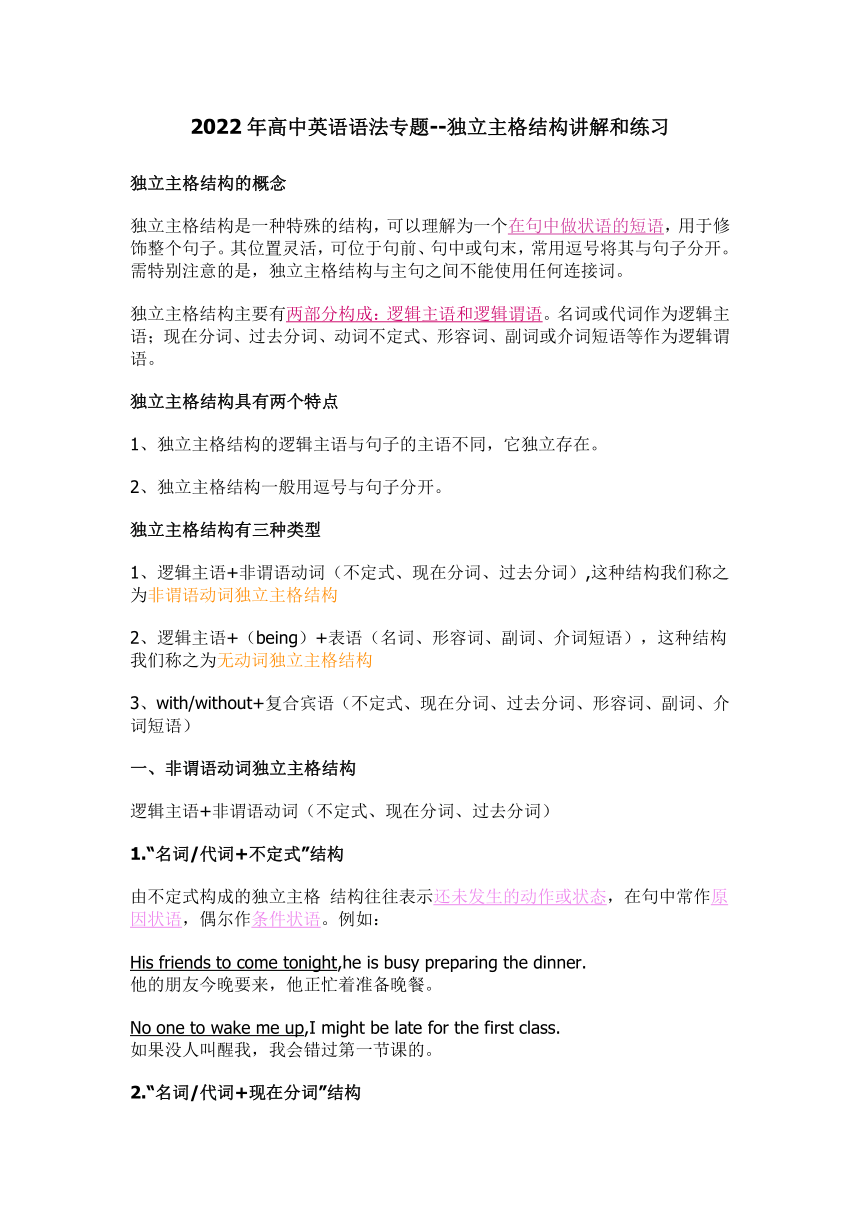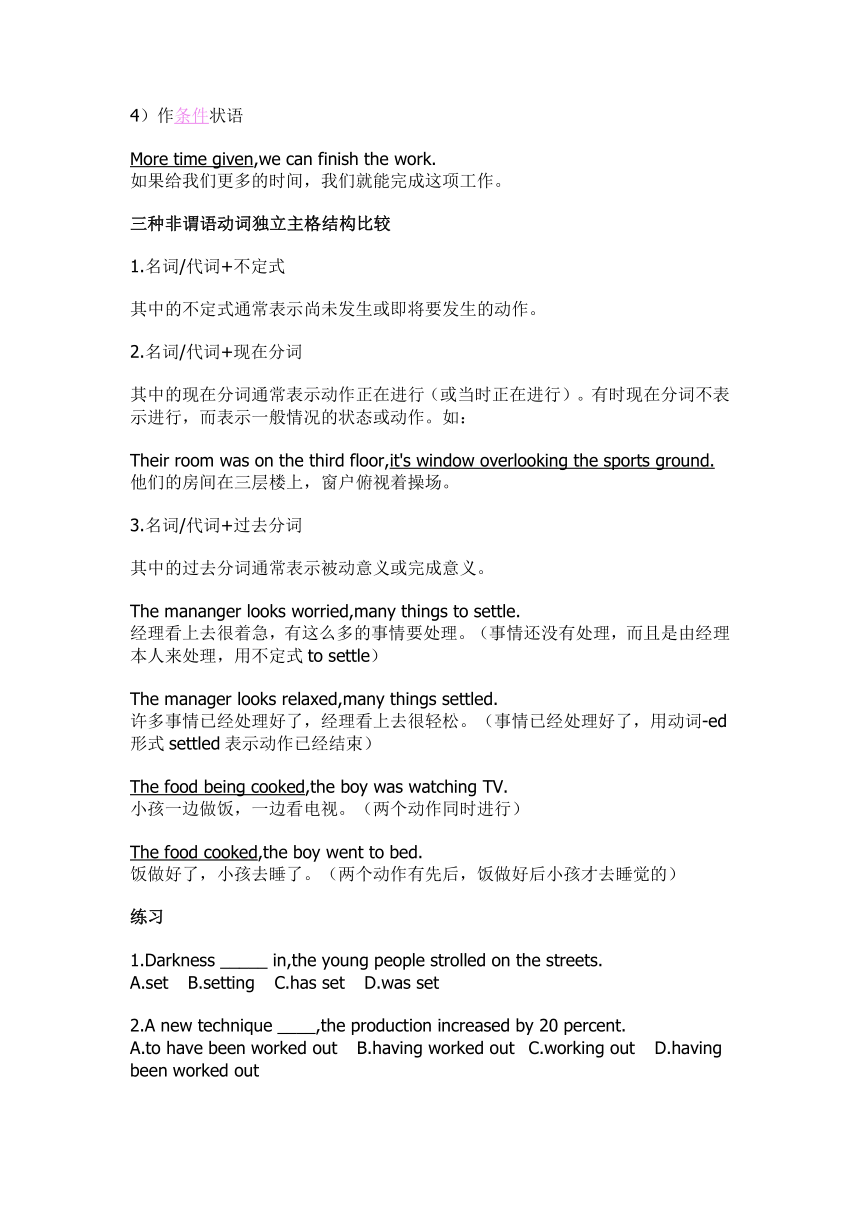2022届高中英语语法专题独立主格结构讲解和练习学案(无答案)
文档属性
| 名称 | 2022届高中英语语法专题独立主格结构讲解和练习学案(无答案) |

|
|
| 格式 | zip | ||
| 文件大小 | 21.2KB | ||
| 资源类型 | 教案 | ||
| 版本资源 | 人教版(2019) | ||
| 科目 | 英语 | ||
| 更新时间 | 2022-02-17 22:55:13 | ||
图片预览



文档简介
2022年高中英语语法专题--独立主格结构讲解和练习
独立主格结构的概念
独立主格结构是一种特殊的结构,可以理解为一个在句中做状语的短语,用于修饰整个句子。其位置灵活,可位于句前、句中或句末,常用逗号将其与句子分开。需特别注意的是,独立主格结构与主句之间不能使用任何连接词。
独立主格结构主要有两部分构成:逻辑主语和逻辑谓语。名词或代词作为逻辑主语;现在分词、过去分词、动词不定式、形容词、副词或介词短语等作为逻辑谓语。
独立主格结构具有两个特点
1、独立主格结构的逻辑主语与句子的主语不同,它独立存在。
2、独立主格结构一般用逗号与句子分开。
独立主格结构有三种类型
1、逻辑主语+非谓语动词(不定式、现在分词、过去分词),这种结构我们称之为非谓语动词独立主格结构
2、逻辑主语+(being)+表语(名词、形容词、副词、介词短语),这种结构我们称之为无动词独立主格结构
3、with/without+复合宾语(不定式、现在分词、过去分词、形容词、副词、介词短语)
一、非谓语动词独立主格结构
逻辑主语+非谓语动词(不定式、现在分词、过去分词)
1.“名词/代词+不定式”结构
由不定式构成的独立主格 结构往往表示还未发生的动作或状态,在句中常作原因状语,偶尔作条件状语。例如:
His friends to come tonight,he is busy preparing the dinner.
他的朋友今晚要来,他正忙着准备晚餐。
No one to wake me up,I might be late for the first class.
如果没人叫醒我,我会错过第一节课的。
2.“名词/代词+现在分词”结构
该结构在句中常作时间状语、原因状语、条件状语、方式或伴随状语等。
1)作时间状语
Everyone having sat down,the teacher began his class.
每个人都坐好后,老师开始上课。(相当于时间状语从句:When everyone had sat down)
2)作原因状语
The boy leading the way,we had no trouble getting out of the forest.
由那个男孩带路,我们没有困难就走出了森林。(相当于原因状语从句:Because the boy lead the way)
3)作条件状语
My health allowing,I will work far into the night.
我的健康许可的话,我愿工作到深夜。(相当于条件状语从句:If my health allows)
4)作方式或伴随状语
We redoubled our efforts,each man working like two.
我们加位努力,一个人干两个人的活。
The students are walking in the school happily,each wearing a card in front of his chest.
学生们快乐地在学校里走着,每个人胸前都带着一张卡。
3.“名词/代词+过去分词”结构
该结构在句中常作时间状语、原因状语、方式或伴随状语、条件状语等。例如:
1)作时间状语
The test finished,we'll have our summer vocation.
考试结束以后,我们将开始暑假了。
2)作原因状语
Thousands of eyes fixed upon him,Nick felt on edge.
上千只眼睛看着他,尼克感到紧张。
3)作方式或伴随状语
When in trouble,Sam would sit alone,head bend.
萨姆遇到麻烦时,总是独自坐着,头低着。
4)作条件状语
More time given,we can finish the work.
如果给我们更多的时间,我们就能完成这项工作。
三种非谓语动词独立主格结构比较
1.名词/代词+不定式
其中的不定式通常表示尚未发生或即将要发生的动作。
2.名词/代词+现在分词
其中的现在分词通常表示动作正在进行(或当时正在进行)。有时现在分词不表示进行,而表示一般情况的状态或动作。如:
Their room was on the third floor,it's window overlooking the sports ground.
他们的房间在三层楼上,窗户俯视着操场。
3.名词/代词+过去分词
其中的过去分词通常表示被动意义或完成意义。
The mananger looks worried,many things to settle.
经理看上去很着急,有这么多的事情要处理。(事情还没有处理,而且是由经理本人来处理,用不定式to settle)
The manager looks relaxed,many things settled.
许多事情已经处理好了,经理看上去很轻松。(事情已经处理好了,用动词-ed形式settled表示动作已经结束)
The food being cooked,the boy was watching TV.
小孩一边做饭,一边看电视。(两个动作同时进行)
The food cooked,the boy went to bed.
饭做好了,小孩去睡了。(两个动作有先后,饭做好后小孩才去睡觉的)
练习
1.Darkness _____ in,the young people strolled on the streets.
A.set B.setting C.has set D.was set
2.A new technique ____,the production increased by 20 percent.
A.to have been worked out B.having worked out C.working out D.having been worked out
3.There are various kinds of metals,each ____ its own properties(特性).
A.has D.had C.to have D.having
4.____, I'll go there with you tomorrow afternoon.
A.Time permits B.If time permitting C.Time permitting D.Time's permitting
5.____, we all went home happily.
A.Goodbye was said B.Goodbye had been said C.Goodbye said D.When goodbye said
6.She stood there,____ from her cheeks.
A.tear's rolling down B.tears rolled down C.with tears rolled down D.tears rolling down
二、无动词独立主格结构
英语中常用的还有一类无动词独立主格结构。这种结构往往看作是“名词/代词+being+表语”结构中省略了being,主要有以下几种情况:
1.逻辑主语+名词
Many people come to visit the city,most of them foreigners.
很多人来参观这个城市,其中大多数是外国人。
I received many Christmas gifts,some of them books.
我收到了很多圣诞礼物,其中一些是书籍。
2.逻辑主语+形容词
He turned to me,his eyes sleepy.
他睡眼惺松的转向我。(his eyes和sleepy之间省去了being)
The little girl entered the room,her face red with cold.
小女孩走进了房间,他的脸冻红了。
3.逻辑主语+副词
School over,we all went home.
放学了,我们都回家了。(school和over之间省去了being)
The music on,I can't focus my mind on the work.
音乐开着,我不能专心工作。
4.逻辑主语+介词短语
He is standing in front of the blackboard,his back towards us.
他站在黑板面前,背对着我们。
Dark clouds in the sky,it is going to rain soon.
天空黑云密布,很快就要下雨。
注意:
1.在表示方式的独立主格结构中,为了使句子简洁,往往将“逻辑主语+介词短语”中的冠词或代词都省略。
The guard stood by the door,(a) gun in (his) hand.
警卫站在门旁,手里拿着枪。
She came in,(a) smile on (her) face.
他进来了,脸上带着笑。
2.独立主格结构中的being在下列两种情况下一般不能省略:一是在“There being+名词”结构中;二是在逻辑主语是代词的情况下。如:
There being no bus,we had to walk home.
由于没有公共汽车,我们只好走回家。
It being Sunday,all the offices are closed.
因为是星期日,所有办公室都关门。
练习
1. _____ no bus,we had to walk home.
A.There was B.There being C.Because there being D.there were
2._____,we all went swimming in high spirits.
A.It being fine weather B.It fine weather C.It was fine weather D.It being a fine weather
3._____,the hunter went into the forest.
A.A gun on shoulder B.A gun was on his shoulder C.Gun on shoulder D.A gun being on shoulder
4._____;we had to put the meeting off.
A.Because the manager was ill B.The manager being ill C.The manager was ill D.Being ill
三、“with/without”引导的独立主格结构
“介词with/without+宾语+宾语补足语”结构可以构成独立主格结构,在句中常作伴随状语、原因状语,也可作定语。上面讨论过的独立主格结构的几种情况在些结构中都能体现,即:
with/without+名词/代词+形容词/副词/介词短语/不定式/现在分词/过去分词
1.with/without+名词/代词+形容词
With his son so disappointing,the old man felt unhappy.
由于儿子如此令人失望,老人感到很不快乐。
2.with/without+名词/代词+副词
With her sister out,she had to stay at home alone.
因为她姐姐出去了,她只能独自待在家里。
3.with/without+名词/代词+介词短语
He stood at he door,with a computer in his hand.
他站在门旁边,手里拿着一台电脑。
The old man,with thick glasses on his nose,is a pianist.
这位带深度眼镜的老人是一位钢琴家。(此句中的with复合结构作定语)
4.with/without+名词/代词+不定式
Without any game to play,the boy looked unset.
没有任何游戏可玩,小男孩看起来很沮丧。
5.with/without+名词/代词+现在分词
Without anyone noticing,I stole into the room.
没有人注意,我偷偷的溜进了屋子。
6.with/without+名词/代词+过去分词
With his homework done,Petter went out to play.
作业做好了,彼得出去玩了。
The boy was crying with his toy broken.
玩具坏了,那男孩在哭。
注意:在with/without复合结构中,多数情况下with能省略,但without不能省略。
With his homework done,Peter went out to play.
His homework done,Peter went out to play.(省略了with)
Without any game to play,the boy looked upset.(without不能省略)
练习
1._____ production up by 60%,he company has had another excellent year.
A.As B.For C.With D.Through
2.With a lot of work _____,I have to sit up tonight.
A.do B.doing C.done D.to do
3.John received an invitation to dinner,and with his work ____ he gladly accepted it.
A.finished B.finishing C.having finished D.was finished
独立主格结构的概念
独立主格结构是一种特殊的结构,可以理解为一个在句中做状语的短语,用于修饰整个句子。其位置灵活,可位于句前、句中或句末,常用逗号将其与句子分开。需特别注意的是,独立主格结构与主句之间不能使用任何连接词。
独立主格结构主要有两部分构成:逻辑主语和逻辑谓语。名词或代词作为逻辑主语;现在分词、过去分词、动词不定式、形容词、副词或介词短语等作为逻辑谓语。
独立主格结构具有两个特点
1、独立主格结构的逻辑主语与句子的主语不同,它独立存在。
2、独立主格结构一般用逗号与句子分开。
独立主格结构有三种类型
1、逻辑主语+非谓语动词(不定式、现在分词、过去分词),这种结构我们称之为非谓语动词独立主格结构
2、逻辑主语+(being)+表语(名词、形容词、副词、介词短语),这种结构我们称之为无动词独立主格结构
3、with/without+复合宾语(不定式、现在分词、过去分词、形容词、副词、介词短语)
一、非谓语动词独立主格结构
逻辑主语+非谓语动词(不定式、现在分词、过去分词)
1.“名词/代词+不定式”结构
由不定式构成的独立主格 结构往往表示还未发生的动作或状态,在句中常作原因状语,偶尔作条件状语。例如:
His friends to come tonight,he is busy preparing the dinner.
他的朋友今晚要来,他正忙着准备晚餐。
No one to wake me up,I might be late for the first class.
如果没人叫醒我,我会错过第一节课的。
2.“名词/代词+现在分词”结构
该结构在句中常作时间状语、原因状语、条件状语、方式或伴随状语等。
1)作时间状语
Everyone having sat down,the teacher began his class.
每个人都坐好后,老师开始上课。(相当于时间状语从句:When everyone had sat down)
2)作原因状语
The boy leading the way,we had no trouble getting out of the forest.
由那个男孩带路,我们没有困难就走出了森林。(相当于原因状语从句:Because the boy lead the way)
3)作条件状语
My health allowing,I will work far into the night.
我的健康许可的话,我愿工作到深夜。(相当于条件状语从句:If my health allows)
4)作方式或伴随状语
We redoubled our efforts,each man working like two.
我们加位努力,一个人干两个人的活。
The students are walking in the school happily,each wearing a card in front of his chest.
学生们快乐地在学校里走着,每个人胸前都带着一张卡。
3.“名词/代词+过去分词”结构
该结构在句中常作时间状语、原因状语、方式或伴随状语、条件状语等。例如:
1)作时间状语
The test finished,we'll have our summer vocation.
考试结束以后,我们将开始暑假了。
2)作原因状语
Thousands of eyes fixed upon him,Nick felt on edge.
上千只眼睛看着他,尼克感到紧张。
3)作方式或伴随状语
When in trouble,Sam would sit alone,head bend.
萨姆遇到麻烦时,总是独自坐着,头低着。
4)作条件状语
More time given,we can finish the work.
如果给我们更多的时间,我们就能完成这项工作。
三种非谓语动词独立主格结构比较
1.名词/代词+不定式
其中的不定式通常表示尚未发生或即将要发生的动作。
2.名词/代词+现在分词
其中的现在分词通常表示动作正在进行(或当时正在进行)。有时现在分词不表示进行,而表示一般情况的状态或动作。如:
Their room was on the third floor,it's window overlooking the sports ground.
他们的房间在三层楼上,窗户俯视着操场。
3.名词/代词+过去分词
其中的过去分词通常表示被动意义或完成意义。
The mananger looks worried,many things to settle.
经理看上去很着急,有这么多的事情要处理。(事情还没有处理,而且是由经理本人来处理,用不定式to settle)
The manager looks relaxed,many things settled.
许多事情已经处理好了,经理看上去很轻松。(事情已经处理好了,用动词-ed形式settled表示动作已经结束)
The food being cooked,the boy was watching TV.
小孩一边做饭,一边看电视。(两个动作同时进行)
The food cooked,the boy went to bed.
饭做好了,小孩去睡了。(两个动作有先后,饭做好后小孩才去睡觉的)
练习
1.Darkness _____ in,the young people strolled on the streets.
A.set B.setting C.has set D.was set
2.A new technique ____,the production increased by 20 percent.
A.to have been worked out B.having worked out C.working out D.having been worked out
3.There are various kinds of metals,each ____ its own properties(特性).
A.has D.had C.to have D.having
4.____, I'll go there with you tomorrow afternoon.
A.Time permits B.If time permitting C.Time permitting D.Time's permitting
5.____, we all went home happily.
A.Goodbye was said B.Goodbye had been said C.Goodbye said D.When goodbye said
6.She stood there,____ from her cheeks.
A.tear's rolling down B.tears rolled down C.with tears rolled down D.tears rolling down
二、无动词独立主格结构
英语中常用的还有一类无动词独立主格结构。这种结构往往看作是“名词/代词+being+表语”结构中省略了being,主要有以下几种情况:
1.逻辑主语+名词
Many people come to visit the city,most of them foreigners.
很多人来参观这个城市,其中大多数是外国人。
I received many Christmas gifts,some of them books.
我收到了很多圣诞礼物,其中一些是书籍。
2.逻辑主语+形容词
He turned to me,his eyes sleepy.
他睡眼惺松的转向我。(his eyes和sleepy之间省去了being)
The little girl entered the room,her face red with cold.
小女孩走进了房间,他的脸冻红了。
3.逻辑主语+副词
School over,we all went home.
放学了,我们都回家了。(school和over之间省去了being)
The music on,I can't focus my mind on the work.
音乐开着,我不能专心工作。
4.逻辑主语+介词短语
He is standing in front of the blackboard,his back towards us.
他站在黑板面前,背对着我们。
Dark clouds in the sky,it is going to rain soon.
天空黑云密布,很快就要下雨。
注意:
1.在表示方式的独立主格结构中,为了使句子简洁,往往将“逻辑主语+介词短语”中的冠词或代词都省略。
The guard stood by the door,(a) gun in (his) hand.
警卫站在门旁,手里拿着枪。
She came in,(a) smile on (her) face.
他进来了,脸上带着笑。
2.独立主格结构中的being在下列两种情况下一般不能省略:一是在“There being+名词”结构中;二是在逻辑主语是代词的情况下。如:
There being no bus,we had to walk home.
由于没有公共汽车,我们只好走回家。
It being Sunday,all the offices are closed.
因为是星期日,所有办公室都关门。
练习
1. _____ no bus,we had to walk home.
A.There was B.There being C.Because there being D.there were
2._____,we all went swimming in high spirits.
A.It being fine weather B.It fine weather C.It was fine weather D.It being a fine weather
3._____,the hunter went into the forest.
A.A gun on shoulder B.A gun was on his shoulder C.Gun on shoulder D.A gun being on shoulder
4._____;we had to put the meeting off.
A.Because the manager was ill B.The manager being ill C.The manager was ill D.Being ill
三、“with/without”引导的独立主格结构
“介词with/without+宾语+宾语补足语”结构可以构成独立主格结构,在句中常作伴随状语、原因状语,也可作定语。上面讨论过的独立主格结构的几种情况在些结构中都能体现,即:
with/without+名词/代词+形容词/副词/介词短语/不定式/现在分词/过去分词
1.with/without+名词/代词+形容词
With his son so disappointing,the old man felt unhappy.
由于儿子如此令人失望,老人感到很不快乐。
2.with/without+名词/代词+副词
With her sister out,she had to stay at home alone.
因为她姐姐出去了,她只能独自待在家里。
3.with/without+名词/代词+介词短语
He stood at he door,with a computer in his hand.
他站在门旁边,手里拿着一台电脑。
The old man,with thick glasses on his nose,is a pianist.
这位带深度眼镜的老人是一位钢琴家。(此句中的with复合结构作定语)
4.with/without+名词/代词+不定式
Without any game to play,the boy looked unset.
没有任何游戏可玩,小男孩看起来很沮丧。
5.with/without+名词/代词+现在分词
Without anyone noticing,I stole into the room.
没有人注意,我偷偷的溜进了屋子。
6.with/without+名词/代词+过去分词
With his homework done,Petter went out to play.
作业做好了,彼得出去玩了。
The boy was crying with his toy broken.
玩具坏了,那男孩在哭。
注意:在with/without复合结构中,多数情况下with能省略,但without不能省略。
With his homework done,Peter went out to play.
His homework done,Peter went out to play.(省略了with)
Without any game to play,the boy looked upset.(without不能省略)
练习
1._____ production up by 60%,he company has had another excellent year.
A.As B.For C.With D.Through
2.With a lot of work _____,I have to sit up tonight.
A.do B.doing C.done D.to do
3.John received an invitation to dinner,and with his work ____ he gladly accepted it.
A.finished B.finishing C.having finished D.was finished
